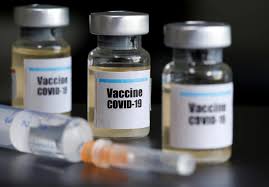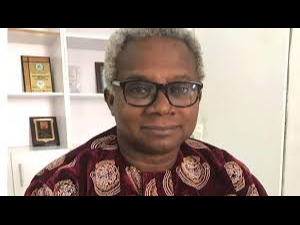Health
FCTA Insists on COVID-19 Vaccination Card or Valid Negative Test Before Entry

By Laide Akinboade, Abuja
In order to prevent the spread of COVID-19, the Federal Capital Territory Administration (FCTA) on Monday said there is no going back on “no COVID-19 jab, no entry” to all its offices.
Senior Special Assistant on Monitoring, Inspection and Enforcement to FCT Minister, Ikharo Attah who led the enforcement team to all FCTA Secretariats, Departments and Agencies, clarified that while no staff or visitors are being forced to take the vaccines, every individual must present either a vaccination card or a negative COVID-19 test result to gain access to the premises.
He stated that considering the fact that the cases of Omicron variant was still surging, stringent measures have to be taken to protect staff and everyone that has anything to do with the administration.
Attah noted that the administration has given staff enough time to choose between any of the options approved to avoid the embarrassment of being turned back at the gate.
According to him, ” We have given a full week for advocacy, and we got a van that went round announcing it. Circulars were also circulated in line with the one earlier issued out by the Head of the Civil Service of the Federation, that staff who are not vaccinated.
“Those who say they don’t want to be vaccinated, will get a negative test result. So if you bring your vaccination card or the negative test result, any of the two can suffice.
” Even if you feel you should not be vaccinated, then get us a negative test result, not more than three days old, and that will get access.
” People thought that we are not serious here, but they have come to let them know that when the Ministers, Malam Muhammad Bello, Dr. Ramatu Aliyu and the Permanent Secretary say something, they mean it”.
Meanwhile, a visit at the offices of Abuja Environmental Protection Board (AEPB), Central Area, Social Development Secretariat, Area 10, Garki, Abuja Metropolitan Management Council, Wuse Zone 6 and others, showed strict compliance as the number of those seeking to have the Covid-19 jab, comprising both staff and non-staff have increased at all the approved centres.
Health
WHO Declares Mpox Public Health Emergency Concern

The World Health Organisation (WHO), says said the Mpox upsurge has continued to meet the criteria of a Public Health Emergency of International Concern (PHEIC) set forth in the International Health Regulations (IHR).
Dr Tedros Ghebreyesus, WHO Director-General said this in a statement.
Ghebreyesus said the announcement followed the fourth meeting of the IHR emergency committee regarding the upsurge of mpox, held on June 5.
According to him, the committee, recognising progress in the capacity to respond in certain countries, advised the WHO boss that the event continues to constitute a PHEIC.
He said that it was based on the continuing rise in number of cases, including a recent increase in West Africa, and likely ongoing undetected transmission in some countries beyond the African continent
“Ongoing operational challenges in responding to the event, including concerning surveillance and diagnostics, as well as a lack of funding, make prioritising response interventions challenging and require continued international support,” he said.
Ghebreyesus concurred with the committee’s advice and issued the committee’s revised temporary recommendations to Member States experiencing mpox outbreaks.
He said the recommendations will guide countries’ efforts to prevent and control spread of the disease.
According to him, the full report of the fourth meeting will be issued in the third week of June.
“The upsurge of mpox in the Democratic Republic of the Congo and its spread to neighbouring countries was first determined to be PHEIC by Ghebreyesus on Aug. 14, 2024.
“Since then, the committee has met on three additional occasions, each time, advising the director general that the event continues to constitute a PHEIC,” he said (NAN)
Health
First Lady, Remi Tinubu, Distributes 10,000 Professional kits to Midwives in South-East

Nigeria’s First Lady, Sen. Oluremi Tinubu, on Monday in Enugu, distributed 10,000 Professional Kits for midwives in South-East aimed improving healthcare delivery in the zone.
Flagging-Off the programme during her two-day official visit to Enugu State , the president’s wife said the distribution were for midwives in the Southeast States of Abia, Anambra, Ebonyi Enugu and Imo.
According to her, the event is to complement the ongoing Federal Government retraining of health workers to improve healthcare of Nigerians.
The programme was part of her Renewed Hope Initiative (RHI) aimed at improving the healthcare of Nigerians especially the vulnerable groups.
She said, “This is a training for 120,000 frontline health workers nationwide.
I have been told that 60,470 health workers have already completed their training.“In view of this, RHI procured 60,000 branded scrubs and 60,000 pairs of crocs as an incentive to encourage health workers”.
She added that, “Since the initial launch of RHI in January 2025, we have distributed 50,000 scrubs and pairs of crocs to five geopolitical zones, namely North Central, North East, North West, South South and the Southwest.
“Today, we are in Enugu to distribute the remaining 10,000, each of the crocs and scrubs”.
She explained that the donation towards it had been made possible through the general support of Anonymous Global Partners, dedicated towards achieving health outcomes for Nigeria citizens.
The first lady said that the donors were committed to supporting the Organisation of the African First Ladies for Development and the health sector in Nigeria and across the world with a specific focus on reducing infant and maternal mortality and morbidity.
“Tuesday by the grace of God, I will be launching the “Free to Shine Triple Elimination Campaign” for HIV, AIDS, Syphilis and Hepatitis B in Enugu.
“This initiative aims to promote healthier mothers, reduce new HIV infections amongst mothers of reproductive age.
“ It will also eliminate mothers through child transmission of HIV, AIDS, which is the vertical transmission and provide treatment for children born with HIV,” Tinubu said.
She said the RHI would be presenting an additional grant of N50 million to the First Lady of Enugu State, with a sum of N50,000 each to 1,000 women petty traders in Enugu State to recapitalize their existing businesses.
In her welcome address, the Wife of Enugu Governor, Mrs Nkechinyere Mbah, appreciated Tinubu for her commitment in building an inclusive society through RHI.
She said the initiative had significantly impacted countless lives across the nation’s diverse geopolitical zones.
“Your noble endeavour has brought succour and hope to communities that have long yearned for such intervention. Here in Enugu State, we are profoundly grateful for the transformative outcomes of RHI.
“Midwives are at the frontiers of maternal and child health. Empowering these important healthcare workers is crucial to the push to reduce maternal and under- five mortality rates radically,” Mbah said.
Tinubu also inaugurated the state-of-the-art Technical, Vocational Education, and Training College (GTC), Enugu.(NAN)
Health
Kwara Govt. Urges residents to Prioritize Oral Hygiene

The Kwara State Government has urged residents to prioritize oral hygiene by maintaining the health of the teeth, gums, and other tissues in the mouth.
Dr Amina El-Imam, the Kwara State Commissioner for Health, made the call on Wednesday in Ilorin during the opening ceremony of a three-day free oral health outreach.
The outreach was organized by the state government in partnership with Pharma Deko PLC.
Represented by the Director of Public Health, Dr Oluwatosin Fakayode, the commissioner described oral health as a vital but often overlooked aspect of overall healthcare.
She reaffirmed the government’s commitment to improving oral health across the state, stressing that it was a key component of general wellbeing.
“Oral health is the cornerstone of overall health, yet it is often neglected.
“Poor oral hygiene contributes to several non-communicable diseases, though its effects are gradual and often unnoticed until they become serious,” she said.
El-Imam commended the recent renovation and equipping of the state’s dental clinic and encouraged residents to take full advantage of the outreach by accessing free dental checks and receiving professional guidance on oral hygiene.
Also speaking, the Managing Director of Pharma Deko PLC, Mr Ishola Olukayode, expressed the company’s commitment to supporting oral health in Nigeria.
He warned that many people unknowingly use harmful substances on their teeth due to a lack of awareness, putting their health at risk.
Olukayode stressed that oral hygiene extended beyond brushing, highlighting the importance of regular professional check-ups and community education.
Delivering a lecture at the event, Deputy Director of Public Health, Dr Kasali Ajao, noted that brushing alone addressed only about 40 per cent of oral hygiene needs.
He recommended professional procedures such as scaling and polishing at least twice a year for comprehensive oral care.(NAN)



























